- Recommended articles
- August 8, 2019
EPS Express Letters
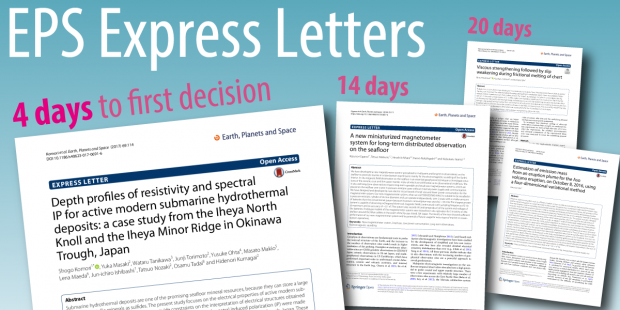
Express Letters provide you with a fast turnaround time, while maintaining rigorous peer review. The turnaround time on average is 43 days from submission to first decision.
The following list gives you the all-time fastest Express Letters in each section published from January 2017 to July 2019 (77 papers in total). Click thumbnails to access article pages.
Section 1. Geomagnetism
-
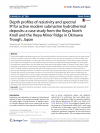 Komori et al. (2017):
Komori et al. (2017):
Depth profiles of resistivity and spectral IP for active modern submarine hydrothermal deposits: a case study from the Iheya North Knoll and the Iheya Minor Ridge in Okinawa Trough, Japan.
[4 days to first decision]
-
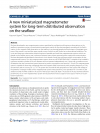 Ogawa et al. (2018):
Ogawa et al. (2018):
A new miniaturized magnetometer system for long-term distributed observation on the seafloor.
[14 days to first decision]
-
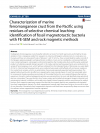 Oda et al. (2018):
Oda et al. (2018):
Characterization of marine ferromanganese crust from the Pacific using residues of selective chemical leaching: identification of fossil magnetotactic bacteria with FE-SEM and rock magnetic methods.
[22 days to first decision]
-
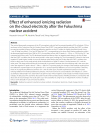 Yamauchi et al. (2018):
Yamauchi et al. (2018):
Effect of enhanced ionizing radiation on the cloud electricity after the Fukushima nuclear accident.
[34 days to first decision]
-
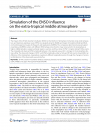 Ermakova et al. (2019):
Ermakova et al. (2019):
Simulation of the ENSO influence on the extra-tropical middle atmosphere.
[35 days to first decision]
-
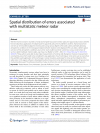 Hocking (2018):
Hocking (2018):
Spatial distribution of errors associated with multistatic meteor radar.
[52 days to first decision]
-
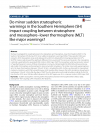 Eswaraiah et al. (2017):
Eswaraiah et al. (2017):
Do minor sudden stratospheric warmings in the Southern Hemisphere (SH) impact coupling between stratosphere and mesosphere–lower thermosphere (MLT) like major warmings?.
[26 days to first decision]
-
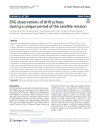 Chang et al. (2019):
Chang et al. (2019):
ERG observations of drift echoes during a unique period of the satellite mission.
[27 days to first decision]
-
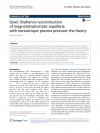 Teh et al. (2018):
Teh et al. (2018):
Grad–Shafranov reconstruction of magnetohydrostatic equilibria with nonisotropic plasma pressure: the theory.
[41 days to first decision]
-
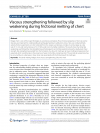 Motohashi et al. (2019):
Motohashi et al. (2019):
Viscous strengthening followed by slip weakening during frictional melting of chert.
[20 days to first decision]
-
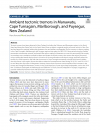 Romanet and Ide (2019):
Romanet and Ide (2019):
Ambient tectonic tremors in Manawatu, Cape Turnagain, Marlborough, and Puysegur, New Zealand.
[22 days to first decision]
-
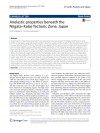 Nakajima and Matsuzawa (2017):
Nakajima and Matsuzawa (2017):
Anelastic properties beneath the Niigata–Kobe Tectonic Zone, Japan.
[25 days to first decision]
-
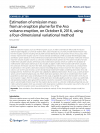 Ishii (2018):
Ishii (2018):
Estimation of emission mass from an eruption plume for the Aso volcano eruption, on October 8, 2016, using a four-dimensional variational method.
[20 days to first decision]
-
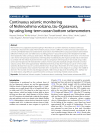 Shinohara et al. (2017):
Shinohara et al. (2017):
Continuous seismic monitoring of Nishinoshima volcano, Izu-Ogasawara, by using long-term ocean bottom seismometers.
[26 days to first decision]
-
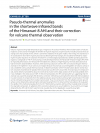 Kaneko et al. (2018):
Kaneko et al. (2018):
Pseudo-thermal anomalies in the shortwave infrared bands of the Himawari-8 AHI and their correction for volcano thermal observation.
[27 days to first decision]
-
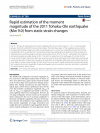 Itaba (2018):
Itaba (2018):
Rapid estimation of the moment magnitude of the 2011 Tohoku-Oki earthquake (Mw 9.0) from static strain changes.
[26 days to first decision]
-
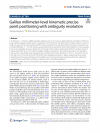 Katsigianni et al. (2019):
Katsigianni et al. (2019):
Galileo millimeter-level kinematic precise point positioning with ambiguity resolution.
[31 days to first decision]
-
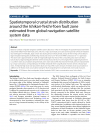 Ohzono et al. (2019):
Ohzono et al. (2019):
Spatiotemporal crustal strain distribution around the Ishikari-Teichi-Toen fault zone estimated from global navigation satellite system data.
[32 days to first decision]
-
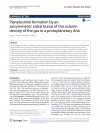 Onishi and Sekiya (2017):
Onishi and Sekiya (2017):
Planetesimal formation by an axisymmetric radial bump of the column density of the gas in a protoplanetary disk.
[29 days to first decision]
-
 Jogo et al. (2018):
Jogo et al. (2018):
Redistribution of Sr and rare earth elements in the matrices of CV3 carbonaceous chondrites during aqueous alteration in their parent body.
[30 days to first decision]
-
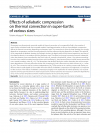 Miyagoshi et al. (2018):
Miyagoshi et al. (2018):
Effects of adiabatic compression on thermal convection in super-Earths of various sizes.
[43 days to first decision]

![[Frontier Letter] Nonplanar 3D fault geometry controls the spatiotemporal distributions of slip and uplift: evidence from the Mw 7.5 2024 Noto Peninsula, Japan, Earthquake](https://www.earth-planets-space.org/wp-content/uploads/2025/03/40623_2025_2187_Figa_HTML-1-48x40.webp)
![[Frontier Letter] The theoretical basis for textural indices of eruption dynamics: review and new conceptual models](https://www.earth-planets-space.org/wp-content/uploads/2024/06/40623_2025_2146_Figa_HTML-66x40.png)


